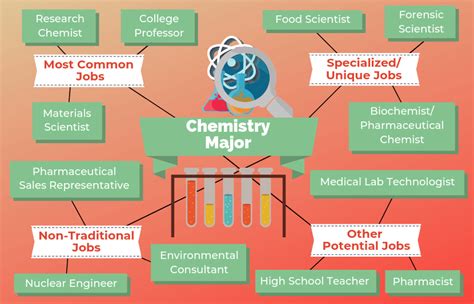Introduction

Chemistry is the study of the composition, structure, properties, and change of matter. It is a fundamental science that underpins many other fields, including medicine, engineering, and materials science. As a result, there is a strong demand for chemists in various industries.
Career Opportunities
Graduates with a chemistry degree have a wide range of career opportunities available to them. They can work in research and development, quality control, production, sales, and marketing. Some of the most common job titles for chemists include:
- Research Scientist
- Analytical Chemist
- Materials Scientist
- Pharmaceutical Chemist
- Environmental Chemist
- Forensic Scientist
- Chemical Engineer
- Science Writer
Industries
Chemists are employed in a variety of industries, including:
- Pharmaceuticals
- Chemicals
- Food and beverage
- Manufacturing
- Energy
- Environmental protection
- Government
Salary Expectations
According to the U.S. Bureau of Labor Statistics, the median annual salary for chemists was $79,780 in May 2021. The lowest 10 percent earned less than $49,350, and the highest 10 percent earned more than $124,810.
Job Outlook
The job outlook for chemists is expected to be good over the next few years. The demand for chemists is expected to grow as the economy recovers and as new technologies are developed.
How to Prepare for a Career in Chemistry
To prepare for a career in chemistry, you need to earn a bachelor’s degree in chemistry. You can also earn a master’s degree or doctorate in chemistry to increase your career options.
In addition to your coursework, you should also gain experience in research and laboratory work. You can participate in research projects with your professors, work as a laboratory assistant, or intern at a company.
Professional Development
Once you have a job, you should continue to develop your skills and knowledge. You can attend conferences, workshops, and online courses to learn about the latest developments in chemistry. You can also join professional organizations, such as the American Chemical Society, to network with other chemists and learn about job opportunities.
Common Mistakes to Avoid
Here are some common mistakes to avoid when pursuing a career in chemistry:
- Not getting enough experience in research and laboratory work.
- Not developing your writing and communication skills.
- Not networking with other chemists.
- Not staying up-to-date on the latest developments in chemistry.
How to Step-by-Step Approach to Get a Job in Chemistry
- Obtain a bachelor’s degree in chemistry.
- Gain experience in research and laboratory work.
- Develop your writing and communication skills.
- Network with other chemists.
- Join professional organizations.
- Apply for jobs that match your qualifications.
FAQs
- What is the difference between a chemist and a chemical engineer?
A chemist studies the composition, structure, properties, and change of matter, while a chemical engineer applies chemical principles to the design, construction, and operation of chemical plants and processes.
- What are the different types of chemistry degrees?
There are three main types of chemistry degrees: bachelor’s degree, master’s degree, and doctorate.
- What are the career opportunities for chemists?
Chemists can work in research and development, quality control, production, sales, and marketing.
- What is the salary range for chemists?
The median annual salary for chemists in May 2021 was $79,780.
- What is the job outlook for chemists?
The job outlook for chemists is expected to be good over the next few years.
- What are the common mistakes to avoid when pursuing a career in chemistry?
Some common mistakes to avoid include not getting enough experience in research and laboratory work, not developing your writing and communication skills, not networking with other chemists, and not staying up-to-date on the latest developments in chemistry.
Conclusion
Chemistry is a rewarding career that offers a wide range of opportunities. If you are interested in a career in science, chemistry is a great option to consider.
